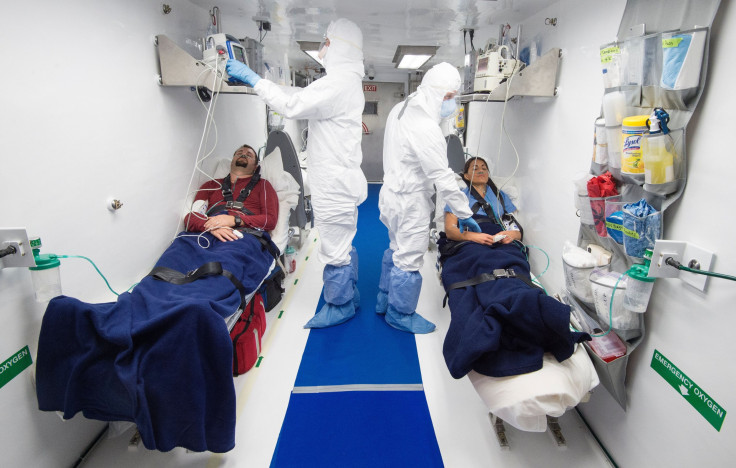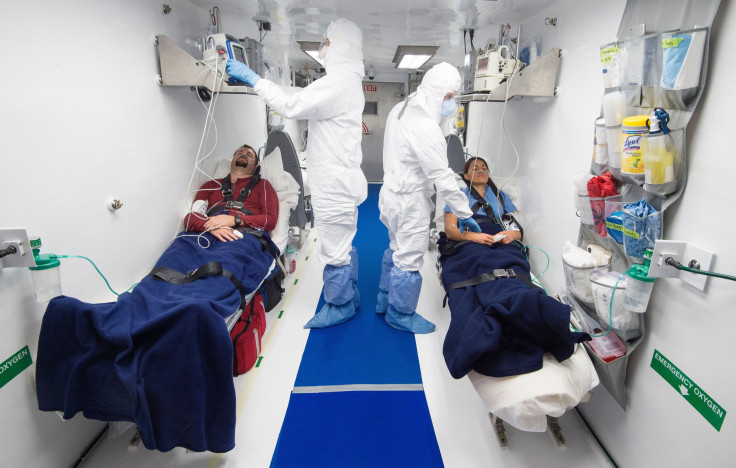Is Ebola Back? 3 Dead, 17 Suspected Of Contracting Virus In Africa

Three people died after contracting Ebola in the Democratic Republic of Congo, the World Health Organization confirmed Saturday. An additional 17 cases of the virus were being investigated by health officials.
The three deaths all occurred in Bas-Uele province, an area bordering the Central African Republic. The first case was reported April 22 after a 39-year-old man became sick and took a taxi took a nearby hospital. The taxi driver subsequently contracted the virus and died, along with the person who had cared for the man before he entered the hospital.
“WHO has already mobilized technical experts to be deployed on the ground and is ready to provide the leadership and technical expertise required to mount a coordinated and effective response,” Dr. Matshidiso Moeti, WHO’s regional director for Africa, said Saturday during a meeting with national authorities in Kinshasa.
Read: World 'Grossly Underprepared' For Another Epidemic
The average fatality rate for Ebola is around 50 percent but can reach up to 90 percent in certain outbreaks, according to the WHO. There have been seven confirmed outbreaks of Ebola since it was discovered in the Democratic Republic of Congo in 1976.
<div class="ftb-widget" data-width="600" data-height="474" data-widget-id="kctjgQxPLwN" data-frozen="true" data-href="http://conditions.healthgrove.com/l/1235/Ebola-Virus-Disease" ></div><script async src="https://s.graphiq.com/rx/widgets.js"></script>
An outbreak that began in August 2014 in West Africa ranked as the most devastating ever, killing more than 11,000 people. A handful of cases made their way to the United States and the WHO declared an international public health emergency. The emergency status was lifted in November 2014.
The WHO has not yet imposed any travel restrictions for the area in which the cases were discovered, but it confirmed in a press release the investigation into the outbreak's severity was ongoing.
The 2014 Ebola outbreak prompted investigations into the international response and revealed findings that were less than promising for future outbreaks of Ebola or similar diseases. A study published in January in the medical journal BMJ reported that the world as a whole was “grossly underprepared” for any future disease outbreaks after researchers at the Graduate Institute of International and Development Studies in Switzerland analyzed reports from West Africa.
“We will not be ready for the next outbreak without deeper and more comprehensive change,” the team said in a press release.
The authors recommended specific changes and improvements be made in future response efforts, including outbreak-related research, reforms to the WHO and an improved humanitarian response.
Read: Global Pandemic Risk Greater Than Ever
“We found remarkable consensus on what went wrong with the Ebola response and what we need to do to address the deficiencies,” the team said. “Yet not nearly enough has been done. Ebola, and more recently Zika and yellow fever, have demonstrated that we do not yet have a reliable or robust global system for preventing, detecting and responding to disease outbreaks.”
Modern conditions make the spread of epidemics like Ebola easier than ever before. An increasing world population combined with improvements in travel and expanded urbanization put more of the population at risk than at any time in the past.
“We are more ready than before,” Jimmy Whitworth, professor of international public health at the London School of Hygeine and Tropical Medicine, told CNN in April. “But the stakes keep getting raised.”

© Copyright IBTimes 2025. All rights reserved.






















